August 29, 2008
Air Date: August 29, 2008
FULL SHOW
SEGMENTS
Environment Takes Center Stage at DNC
/ Jeff YoungView the page for this story
Now that the Democrats have wrapped up their convention, Living on Earth assesses the growing importance of the environment, climate change and energy to the party as the race for the White House heats up. Host Steve Curwood talks with Washington correspondent Jeff Young from the convention floor in Denver. We also take a look at Vice Presidential nominee Joe Biden’s environmental record. Senior Reporter Darren Samuelsohn of the online environmental news service Greenwire tells LOE producer Mitra Taj that Senator Biden’s foreign policy experience includes efforts to get the U.S. to act on climate change. (10:30)
Green Jobs Hot Topic
View the page for this story
The next president will be confronted with the challenges of climate change and energy security and some say the solution to both those issues is the same: the creation of a “green economy.” Host Steve Curwood turns to Phil Angelides, chairman of the board of the Apollo Alliance, a coalition of business, labor, and environmental groups that promotes clean energy technology and the creation of green jobs. (04:00)
Peering into the Platform
View the page for this story
Living on Earth takes a look at the environmental issues in the Democratic platform, ranging from coal to climate change, with the help of Congressman Jay Inslee of Washington State. (08:00)
Greening the DNC
/ Bobby BascombView the page for this story
From ethanol-powered cars to compostable food containers, the Democratic National Committee set an ambitious goal to make this the greenest convention in American history. Living on Earth's Bobby Bascomb reports from Denver, Colorado. (06:00)
Udalls Campaign on Green Credentials
/ Jeff YoungView the page for this story
Cousins Tom and Mark Udall come from one of the most storied families in Western environmental politics - their fathers helped craft the nation's landmark conservation measures. Now, the cousins are both running for the U.S. Senate - Tom from New Mexico and Mark from Colorado. Living on Earth's Jeff Young reports from the campaign trail. (08:35)
Antarctic Mash
View the page for this story
Performance artist Paul Miller, aka DJ Spooky, brings his new performance project “Terra Nova – An Antarctic Suite” to Denver. The multimedia piece includes geographic and scientific visual material, along with audio samples from his recent visit to Antarctica mixed with electronic beats. DJ Spooky tells Living on Earth the project is his response to the rapidly changing planet. (05:00)
Convention Wrap Up
/ Jeff YoungView the page for this story
Host Steve Curwood and Jeff Young look ahead to the Republican Convention in Minneapolis, where the GOP platform promises a different approach than the Democrats to issues of powering America and tackling global warming. (03:00)
This week's EarthEar selection
listen /
download
Sounds by artist Jim Green come out from under the city that hosted the DNC.
Show Credits and Funders
Show Transcript
HOST: Steve Curwood
GUESTS: Phil Angelides, DJ Spooky, Congressman Jay Inslee, Darren Samuelsohn
REPORTERS: Bobby Bascomb, Jeff Young
[THEME]
CURWOOD: From Public Radio International – This is Living on Earth.
[THEME]
CURWOOD: I’m Steve Curwood. In Denver, Democrats pass the torch to Barack Obama. He accepts the presidential nomination and promises green jobs to get America back to work.
OBAMA: I’ll invest 150 billion dollars over the next decade in affordable, renewable sources of energy, wind power, and solar power and the next generation of biofuels- an investment that will lead to new industries and five million new jobs that pay well and can’t be outsourced.
CURWOOD: And while the presidential hopeful makes mile-high promises, his running mate Joe Biden skewers the record of the GOP’s presidential candidate – John McCain.
BIDEN: John voted again and again against renewable energy: solar, wind, biofuels. That’s not change; that’s more of the same.
CURWOOD: We’ll have that and more, this week on Living on Earth. Stick around!
[MUSIC: Boards Of Canada “Zoetrope” from “In A Beautiful Place Out In The Country” (Warp Records 2000)]
Environment Takes Center Stage at DNC
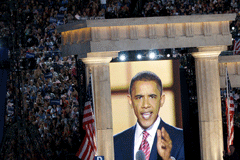
Senator Barack Obama accepted his party’s nomination for presidential candidate and promised to invest $150 billion in renewable energies if elected. (Photo: Jackson Solway, Courtesy of the Democratic National Convention)
[THEME]
CURWOOD: From the Jennifer and Ted Stanley studios in Somerville, Massachusetts, This is Living on Earth. I’m Steve Curwood.
The bunting is gone. The Obama signs packed up, the barriers taken down. The delegates to the Democratic National Convention went home from Denver with renewed calls for change and unity. And those concerned about the environment and energy found climate change in the list of top priorities cited in the historic acceptance speech of nominee Barack Obama.

Democratic Presidential Nominee Barack Obama greets guests at the Democratic National Convention in Denver, Colorado. (Photo: Audrey Rose, Courtesy of the Democratic National Convention)
CURWOOD: And with the state of the climate clearly linked to the state of the nation’s security and economy. Obama declared there is now a great opportunity to find low carbon ways to put America to work.
OBAMA: As president I will tap our Natural gas reserves, invest in clean coal technology and find ways to safely harness nuclear power. I’ll help our auto companies retool, so that the fuel-efficient cars of the future are built right here in America.
CURWOOD: And Barack Obama is prepared to pour in taxpayer money.
OBAMA: I’ll invest 150 billion dollars over the next decade in affordable renewable sources of energy, wind power, and solar power, and the next generation of biofuels - an investment that will lead to new industries and five million new jobs that pay well and can’t be outsourced.
CURWOOD: With me now is Living on Earth’s Jeff Young who spent a week at the convention. Hi there.
YOUNG: Hey Steve.
CURWOOD: Now Jeff in past election cycles, environmental activists have complained that the issue of global warming didn't get the attention it deserved. I guess this year's kinda different, huh?
YOUNG: Absolutely. And you know it's almost not even a quote, unquote "environmental" issue by itself anymore. I think there’s that connection between climate concerns energy costs, the economy, national security all tied up together, and collectively those things are right near the top of voter concerns and, so of course, they're getting a lot of play in the campaign rhetoric.
CURWOOD: Alright, so now the Democrats have recognized the problem, what do they propose doing about it?

Senator Barack Obama accepting his party’s nomination for presidential candidate. (Photo: Jackson Solway, Courtesy of the Democratic National Convention)
CURWOOD: Let's hear a little sampling of some of the green moments in the big speeches:
GORE: It just so happens that the climate crisis is intertwined with the other two great challenges facing our nation: reviving our economy and strengthening our national security. The solutions of all three require us to end our dependence on carbon-based fuels.
HILLARY CLINTON: We need a President who understands we can’t solve the problems of global warming by giving windfall profits to the oil companies while ignoring opportunities to invest in new technologies that will build a green economy.
SCHWEITZER: It’s not a question of either wind or clean coal, solar or hydrogen, oil or geothermal. We need them all to create a strong American energy system, a system built on American innovation.
CURWOOD: Now Jeff I recognized two of those voices, of course Al Gore and Hillary Clinton. But who was that last voice we heard from?

Montana Governor Brian Schweitzer speaking at the DNC.
CURWOOD: But his message is a little different from the others. I mean Al Gore and Hillary Clinton are talking green energy and bashing big oil, Governor Schweitzer was saying we need more oil and more coal.
YOUNG: Well that's right and that points to a real tug of war that was going on just below the surface here in Denver as the Democrats were trying to strike a balance on energy. They very much want to reach out to states like Governor Schweitzer’s Montana, where people dig coal and drill oil but also have a lot of potential for wind and biofuels. Same kind of story in say, Virginia. Very important electoral state. Former Virginia Governor Mark Warner, who's now running for Senate, gave the convention's keynote address. Warner supports expanding offshore drilling. So People like Warner, Schweitzer and other moderates from energy producing states, they want their party to compromise. They know they’re getting hurt by Republicans who have very effectively seized on the issue of high-energy prices with a pro-drilling message. And those moderate Democrats want to respond with a message that says yes to some drilling yes to some coal yes to a lot of green energy too, sort of an "all of the above" message.
CURWOOD: Somehow, I got the impression that that’s not going to play so well with the greener elements of the party. What do you think?
YOUNG: Not at all, and there is quite a bit of tension within the party over this. And we heard some pushback against any kind of expansion of drilling from some top Democrats, including Harry Reid of Nevada. He’s the senate’s majority leader.
REID: The simple fact is that the promise of more oil isn’t part of the solution; it’s part of the problem. At best this is an 18th century answer to a 21st century crisis. At worst it’s pure baloney.
YOUNG: So this is not an issue where all the Democrats are on the same page just yet and I think it’s gonna be interesting to see what sort of message Obama and Biden decide they’re going to emphasize.
CURWOOD: Now Senator Obama used the Convention to showcase his running mate, long time Delaware Senator Joseph Biden. Of course part of the vice presidential candidate's role is to go on the attack against the opposition. And Joe Biden certainly did just that. He went after Republican nominee John McCain's environmental record.
BIDEN: Even today, as oil companies post the biggest profits in history— nearly a half trillion dollars in the last five years—John wants to give them another $4 billion dollars in tax breaks. That’s not change, that’s the same. And during the same time John voted again and again against renewable energy: solar, wind, biofuels. That’s not change; that’s more of the same.
CURWOOD: So Jeff what do you make of that?
YOUNG: I think it’s interesting because McCain has really has been an advocate for cutting greenhouse gas emissions. But, as Biden pointed out there, Senator McCain has not voted for the kind of government support for alternative energy that a lot of people in the green field want to see. In fact he missed some very critical votes this year. So Democrats are going to try to draw sharp distinctions by digging down into the McCain record – make him seem kinda like President Bush – too cozy with big oil, that sort of thing.
CURWOOD: Now Joe Biden has spent a lot of time on the Senate Foreign Relations committee, most recently as chair. Mitra Taj spoke with Darren Samuelsohn. He’s a senior reporter for the on-line environmental news service Green Wire.
TAJ: Senator Biden is of course very well known for his foreign policy leadership in the Senate, what can you tell us about his environmental record?
SAMUEHLSON: Well as the chairman of the senate foreign relations committee for the last two years he has been a leader in trying to prod the Bush administration into taking a more proactive approach in international global warming negotiations, and actually holding hearings in the senate committee that he is in charge of, to put the spotlight on all the international complexities of climate change and that means thinking about how rising temperatures and rising seas and the effects in developing nations can have on U.S. national security.
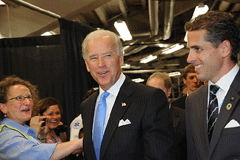
Senator Joseph Biden. (Courtesy of the Democratic National Convention)
TAJ: Could he be more successful as a vice president than as a senator?
SAMUEHLSON: Absolutely, as a vice president, as we saw with Dick Cheney here in the last eight years, a vice president certainly can have a lot of influence in how policy is shaped and as a statesman and someone who has been in the senate for more than two decades, he knows what it takes to get legislation through and he knows what it would also take, very importantly to get a treaty ratified. Ultimately that’s the goal in the international climate negotiation processes, is to get a treaty in place in the 2012, 2013 time period that would be ratified by the United States Senate which take 67 votes, which is a huge hurdle to overcome. And as the former chairman of the Senate Foreign Relations Committee, Senator Biden, if he was the vice president, certainly knows what levers need to be pulled to try and make that happen.
CURWOOD: That’s Darren Samuelsohn of Green Wire speaking with Living on Earth’s Mitra Taj.
CURWOOD: So Jeff tell me, how would Joe Biden do as president of the Senate—one of the official duties of the Vice President of the United States?
YOUNG: Well you never know. He might end up casting the deciding vote on an energy or climate change issue. I think we know there are going to be very hard fought battles. And it’s a little ironic that here we have candidate Biden on the attack against Republicans on this issue, but as Senator Biden, really worked very well with Republicans on climate change – partnered with the top Republican on the Foreign Relations committee. If there is an Obama-Biden administration he’s going to have to return to that bi-partisan mode if he really wants to get anything done.
CURWOOD: And what about before the election? Won’t Joe Biden and Barack Obama have some problems getting their own party in line on the green agenda?
YOUNG: Uh, that may turn out to be just as tough. There’s a real diversity of opinion on energy issues among Democrats and I got a sense of that by walking around the floor and talking to Delegates from different states. I asked them, “What do you think Obama’s top priority should be, as President, when it comes to energy and the environment?”

(Photo by Jackson Solway, Courtesy of the Democratic National Convention)
HOLMES: My name is Representative Lindsey Holmes and I am from Anchorage, Alaska. I think at this point in time the top priority’s got to be renewable energy. It’s got to be energy security and weaning us off fossil fuels and onto the great renewable potential that we have here in the U.S. and we are an oil and gas state and even up there we got plenty to spare at this point but even we are putting huge efforts into renewables and really weaning ourselves off the dependence on foreign oil.
COUWNIE: I’m Frank Couwnie, Mayor of the city of Des Moines. We can create a lot of green jobs around this country by urging conversion to energy efficient buildings and residences and commercial buildings and save a lot of the greenhouse gases that emitted from coal plants. We have to switch to renewals and off of fossil fuels and that ought to be one of our absolute top priorities.
MARSHALL: My name is Charlene Marshall and I’m from Morgantown, West Virginia. Course I’m hoping in energy he’s going to be working with West Virginia because we produce so much coal and we’re just in the process of building a refinery in Moundsville, West Virginia for coal liquefaction and I’m hoping that he will come to the table and that we’ll be able to do some things with the coal and that will produce some much needed jobs throughout West Virginia.
CURWOOD: Thanks Jeff. We’ll come back to you in a bit. Just ahead: The greening of the Democratic platform. You’re listening to Living on Earth.
[MUSIC: Organissimo : “Traces” from Groovadelphia (Big O Records 2008)]
|
**WEB EXTRA** Biden's Enviro Record - Listen to Gene Karpinsky, president of the League of Conservation Voters, talk with Steve Curwood about Joe Biden’s environmental score.
Related links:
Green Jobs Hot TopicCURWOOD: It’s Living on Earth, I’m Steve Curwood. Jobs, jobs, jobs. In a year when many people are losing their homes to foreclosure and take home pay is being shrunk by high gas and food prices, there’s nothing like the promise of a good secure job to warm the heart of the average voter, and the Democrats certainly didn’t miss that trick at their convention. Speaker after speaker echoed the promise of new jobs linked to energy and cleaning up the environment, as outlined in the party platform. It reads, and I quote: “We Democrats commit to fast track investment of billions of dollars over the next ten years to establish a green energy sector that will create up to five million jobs. This transition to a clean energy industry will also benefit low-income communities.” Joining me to talk about how an Obama presidency would affect the green economy is Phil Angelides. He’s the former State Treasurer of California, and chair of the board of the labor and environmental lobbying coalition known as the Apollo Alliance. Mr. Angelides, welcome to Living on Earth ANGELIDES: It’s great to be with you. Thank you for having me on today. CURWOOD: What kind of jobs are we talking about? To someone who is listening to us what kind of jobs should they be thinking maybe they’ll get or maybe their kids might get? ANGELIDES: I think the kind of jobs we’re talking about can be anything from skilled workers building trades who are making buildings more energy efficient or installing solar panels, to Americans who are working to improve our power grid, to Americans who are building the public transportation systems of the 21st century, to people working in auto factories making fuel efficient vehicles, to scientists and engineers who are developing energy efficient products for the marketplace. There’s a whole range of jobs across the economy that can result from this conversion away from an oil economy to a clean energy economy. CURWOOD: And if I come from a low-income neighborhood where people don’t have a lot of education or a lot of opportunity, what’s in it for us? ANGELIDES: What’s in it, hopefully, for all Americans including folks in low-income communities is the possibility of an economy of broadly shared prosperity. Part of our agenda, part of the next presidents agenda has to be to reach into those communities to train people to educate people to give them the skill sets not only to compete for, but to win, the jobs in this new green collar economy. All over this country there are the beginning signs of a new commitment to provide pathways out of poverty. And I will just say, clearly, at the Apollo Alliance we do not believe this clean energy revolution will be whole unless there is the possibility for the poorest Americans in inner city neighborhoods or rural areas to be a part of this new green economy. We won’t have been successful in our goals, because this is about confronting climate change. It is also about restoring the notion of broad based prosperity in the American economy—a notion that’s been eroded now for four decades. CURWOOD: So how confident are you that an Obama administration would be willing to go up to capitol hill reach in the pockets and spend these many, many, you’re talking about hundreds of billions of dollars, on this sector of the economy and retraining? There are a lot of competing issues, I am thinking of healthcare, social security. That’s a big price tag. ANGELIDES: Well, Obama has made a very firm commitment in his platform, in fact he is the first candidate I can ever remember running TV ads across the country as part of his campaign, making a clear commitment to invest in our industries, in our communities, in our peoples to build the new green economy. And I want to say something here in terms of how we pay for this. The fact is a lot of money we spend today can be redirected so its better-spent creating green collar jobs. We spend a lot of money on transportation and housing for example that needs to be spent in a way that supports the new green economy. Hopefully, we can also put in place what we call a cap and invest program where we charge polluters for putting carbon into our atmosphere and we take the money that we charge those polluters and we redirect that money to make investments in research and development in education and reindustrialization here in America to support the green economy. CURWOOD: Phil Angelides is the former state treasurer of California and ran as the democratic nominee for governor. He is now chairman of the board at the Apollo Alliance. Thank you so much for taking this time Phil. ANGELIDES: My pleasure. Related links:
Peering into the Platform
Congressman Jay Inslee. CURWOOD: Now, for many of the most ardent environmental advocates, jobs are just the beginning of what they would like to see in a green revolution in America. At the core of this is the threat of climate disruption from the burning of coal and oil and its links to the current economic difficulties. Among the democrats in the house who are the greenest advocates is Jay Inslee of Washington State. He’s on the house committee on Energy and Commerce and the select committee on Energy Independence and Global Warming. He joins us to discuss the Democratic platform. Thank you for appearing with us Congressman. INSLEE: You bet. CURWOOD: In your book “Apollo’s Fire; Igniting America’s Clean Energy Economy” you tackled the alternative energy challenge. Now how does this democratic platform that’s been adopted measure up to the plan that you outline in your book? INSLEE: Well, I’m thrilled. I’ve been waiting now for at least half a decade for democrats to lead the country to an optimistic energy future based on clean energy and I think the moment has arrived. The planets have just aligned perfectly where the technology for the new clean energy from solar to thermal to photovoltaic to enhanced geo thermal, they’ve all arrived. The science of global warming is absolute consensus and clear as a bell. And now we are going to have a president who gets it heart and soul who is really going to ask America to lift their sights and I think fundamentally Senator Obama and the democratic platform believe that it’s a moment where we should stop looking just below our feet for energy and start looking above our shoulders and between our ears because that’s where the infinite source of energy is, which is American ingenuity - and this platform and this president is going to deliver on that message. It’s a can-do optimistic message and optimism always wins in this country. CURWOOD: Speaking of beneath our feet, in your book you said that coal can be compressed into a diamond, but diamonds are not necessarily a girl’s best friend when it comes to the environment. You point out a lot of dangers about coal. This platform is really vague about coal, congressman. At one point it says we need to quote, “clean up our coal plants,” but what does that mean and what should be done and how does that meet your expectations for a clean energy future for America? INSLEE: I think it’s real clear that there’s no silver bullet that we have to embrace all technologies that have the potential to be zero CO2 emitting clean energy technologies. And so none should be ignored and all have to be embraced in the research and development platform. We don’t know which one of these technologies will be dominate. Some of them may not succeed. And it’s like any investment strategy we need to be prudent and not put all of our eggs in one basket. Here’s one caution though, we are not going to allow the budget for coal, even though it is now a dominate source of energy to overwhelm the budgets for solar wind, geothermal, lithium-ion batteries, and the rest. We have got to have a distribution of the research pie, if you will, oriented to the potential of these new technologies, not their historical artifact and that will be a debate in congress in the upcoming session to make sure we have an adequate research budget, based on the future, which are these truly clean renewable sources like solar, wind and the like and that’s a direction this country is worthy of. CURWOOD: There’s a quote that says, quote, “We must end the tyranny of oil in our time.” My question to you is how does any president deal with this? If you look at the Fortune 500 listing of the top 10 companies in the world, six are oil companies, in terms of revenue, and the top five most-profitable companies are oil companies as well. How does a president of the U.S. take on what is arguabley the most profitable and powerful industry on the planet? INSLEE: Well, Senator Obama isn’t doing this rhetorically. He has already stepped up to the plate and gone nose to nose with the oil and gas industry which has been tyrannical in a sense in Washington D.C. It has driven the agenda of lock, stock and barrel during the Republican domination of two oilmen in the White House. And I think that was most apparent when we had a vote, which passed in the house that would reel back in about 20 billion dollars of unjustified subsidies of the oil and gas industry, its not like the companies are hurting right now and they need Uncle Sam to help them and would have put that money into a clean energy fund for solar and wind and lithium ion batteries and plug-in electric hybrid cars to help consumers get efficient vehicles. Now this was a fundamental defining moment in the U.S. Congress about whether we were going to finally break the shackles of oil, which has stymied progress in clean energy to date. And we had, interestingly enough, our two candidates for president were tested at that moment and Barack Obama stepped up to the plate and hit it out of the park and voted to reel back in that money from oil and gas and put it into a clean energy future his opponent Senator McCain was AWOL. He was in Washington D.C. but he didn’t vote. We needed one vote. The country needed Senator McCain to step up to break the filibuster we had 59 votes. We needed one more Senator to change the course of this country and Senator McCain was AWOL. Now if that is not a defining difference between these two candidates I don’t know what is. It was replicated in the vote on the renewable portfolio standard where Senator Obama voted for a 15% standard for clean energy for solar, wind and the like for electricity. Senator McCain voted with the oil and gas industry and voted against it. So I got to tell you when I saw Senator McCain’s ad the other day with wind turbines in it, I about went through the roof. My wife had to peel me off the ceiling. Here’s a guy that stuck a dagger in the heart of a new idea for clean energy, voted under the thumb of oil and gas and now pretends to be a leader on the subject. We need Senator Obama on this. It is a clear choice and I think you can see what side I’m fighting on.  U.S. Rep Jay Inslee INSLEE: Well it is gonna be a challenge for any new president and new congress for us to do very quickly. We only have a matter of months to really reverse course. But I believe this guy has what it takes to cut the mustard and I’ll tell you why I believe this. Number one, he has already shown his chops on this issue. He has already demonstrated a very aggressive bold plan. He has asked for a 100% auction for polluters to have to pay for pollution. He’s got an aggressive position on what the CO2 cap will be. I think he’s already sort of confronted the oil and gas paradigm. And I think in listening to him, he understands that the need for this technological transformation is absolutely imperative. Al Gore gave us the challenge of de-carbonizing our economy in ten years or so. Which is an ambitious program. But it isn’t Al Gore’s timeline, it’s mother natures. So what we have is a perfect alignment of the planets together with a moment in history. You know, if we didn’t have John F. Kennedy in May, 1961 we would have not gone to the moon. And we are going to need Senator Obama in office on January 20, 2009 if we are going to create a new technological revolution. And I think we are going to get that, and boy I’ve been waiting for it for over a decade. CURWOOD: Jay Inslee is a Democrat from Washington State. Thank you Congressman Inslee. INSLEE: Thank You. Related links: [MUSIC: Various Artists/Bombay Dub Orch “Feel” from Eden (Six Degrees Records, 2005)] Greening the DNC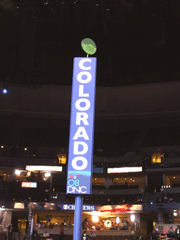
Delegations that offset their carbon emissions getting to the convention got a green Obama tag at the top of their state sign. (Photo: Bobby Bascomb) CURWOOD: Perhaps it's a sign of the times that both the Democratic and Republican National conventions this year are being powered by wind, and not just from the podium. Both parties said they would make theirs the greenest convention they've ever held. Living on Earth's Bobby Bascomb went to Denver to bring us this story of how the Democrats went green—with help from a prominent Colorado Republican. [CAR SOUNDS] BASCOMB: A green convention requires green transportation. So the DNC in Denver provided flex fuel vehicles that run on ethanol made from beer. PAINE: When you make beer, you make ethanol. BASCOMB: Roger Paine is Coproducts manager for Coors brewery in Golden Colorado. Ethanol, another name for ethyl alcohol, is what gives all alcoholic drinks their kick. Coors has been in business making beer and ethanol, since 1873. On a tour of the brewery Paine explains that brewing beer generates a great deal of ethanol. [AMBIENT SOUNDS] PAINE: When you go through the first process it's called fermentation. For every pound of yeast you put in, you're going to get three pounds back. So, we have begun many years ago to start to process that yeast and dry it. And in the course of drying you pull out an awful lot of ethanol. BASCOMB: All that extra yeast is mixed with waste beer to produce a slurry that looks like soaked bread. After filtering and heating inside a tower of metal tubes. What remains is steam and food grade 200 proof ethanol. 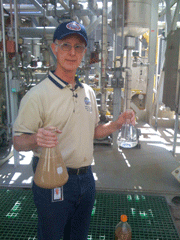 Rick Paine is co-products manager at the Coors brewery. In his right hand is waste yeast and in his left pure 200 proof ethanol. (Courtesy of Colin Wheeler) BASCOMB: At the bottom of the distillation tower is a spigot with a stack of cups next to it. PAINE: Did you taste? Come on. BASCOMB: (on tape) So, you're literally just pouring it out of the tap and into a glass. PAINE: I just poured it out of that tap BASCOMB: (on tape) It's warm. PAINE: Oh, sure because it's processing, I mean it's just finished coming through the still. Just a little taste. It's very astringent. BASCOMB: Whew! It's kind of got a beer essence to it though. PAINE: Well, yeah! That's good. And that's a wonderful observation because it all comes out of beer. BASCOMB: Ethanol that isn't sampled at the spigot gets mixed with a little bit of gasoline, to avoid a revenue tax, and gets sold locally. Coors stockpiled 40,000 gallons of ethanol, about 20 percent of their annual production, to donate to the Colorado host committee for the Democratic National Convention. 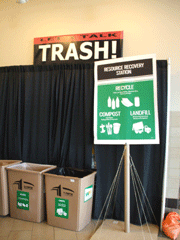 Trash at the DNC was separated into bins marked recycle, compost, and landfill. The DNC hopes to have just 10 percent of the trash end up in a landfill. (Photo: Bobby Bascomb) BASCOMB: Al Timothy is vice president of public affairs for Coors. Pete Coors, chairman of the Coors Brewing Company has always been active in politics. In 2004 he ran for the Colorado senate...as a Republican. But Al Timothy says providing the free ethanol isn't a partisan issue. TIMOTHY: Well, our donation of the fuel grade ethanol was really an effort to try to assist the Denver Host Committee and the Democratic National Committee to showcase Denver as a great tourist destination venue. BASCOMB: In the past Denver had problems with particulate matter in the air and the city is currently not compliant with EPA standards for ground level ozone. The recycling rate is just 12 percent, about 1/3 the rate of other big cities. But Mayor John Hickenlooper sees the DNC coming to town as a catalyst for change. He plans on keeping the 1,000 free bikes brought in for the Convention – even expanding the program for Denver residents. 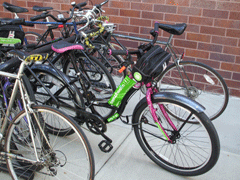 Denver provided 1,000 bikes for delegates to commute around the city. (Photo: Bobby Bascomb) [SOUND OF CONVENTION AND FOOD VENDORS] BASCOMB: In keeping with the green goals, hot dogs and nachos inside the convention center were served in compostable cardboard containers and corn-based plastic boxes. Every 200 feet or so was a trash area with green bins marked recycle, compost and landfill. Just in case you were tempted to mix rubbish the area was guarded by volunteers in green T-shirts. WOMAN: You bought this here, correct? BASCOMB: (on tape) I did. WOMAN: Alright then this is completely compostable. WOMAN 2: It's made of corn. BASCOMB: A non-corn based coffee cup ends up in the receptacle marked landfill. And after the convention ended, another group of volunteers sorted all the trash produced to make sure it was properly segregated. [SOUNDS OF THE DELEGATION HALL] BASCOMB: In yet another bid to be green, the DNC challenged its 4400 delegates to offset the carbon produced by their travel. Most delegates chose to donate $7.50 per person to green energy projects. But Jennie Davidson of Kansas says her delegation chose to donate instead to Greensburg, the Kansas town destroyed by a tornado this year. DAVIDSON: They have made a strong goal to rebuild that community completely green. So we went ahead and offset our footprint in Kansas too, by donating to Greening Greensburg.  Delegations that offset their carbon emissions getting to the convention got a green Obama tag at the top of their state sign. (Photo: Bobby Bascomb) HICKENLOOPER: You know if Minneapolis wants to compete to be the greenest convention, come at us. You know we'll do everything we can to help you and the we'll do everything we can to beat you. BASCOMB: For Living on Earth I'm Bobby Bascomb in Denver, Colorado. Related links: [MUSIC: Donald Fagan “Green Flower Street” from The Nightfly (Warner Bros, 1982)] Udalls Campaign on Green Credentials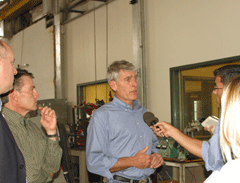
Jeff Young interviews Mark Udall on a tour of Colorado State University’s Engines and Energy Conversion Laboratory. (Photo: Lana Hoff) CURWOOD: Coming up – When Western green politics are your family’s business, you name is probably, Udall. Their story is just ahead on Living on Earth! ANNOUNCER: Support for the Environmental Health Desk at Living on Earth comes from the Cedar Tree Foundation. Support also comes from the Richard and Rhoda Goldman fund for coverage of population and the environment...and from Gilman Ordway for coverage of conservation and environmental change. This is Living on Earth on PRI, Public Radio International. [MUSIC: Todd Sickafoose from Tiny Resistors (Cryptogramophone Records, 2008)] CURWOOD: It's Living on Earth, I'm Steve Curwood. The Democrats chose Denver for their convention in part because of what they see as a shift in the politics of the mountain regions of the West. No longer is a Democrat a lone maverick in a state like Colorado. In fact as the issues of water, energy and the economy grow in importance, Democrats are corralling increasing numbers of voters who have cut themselves out of the Republican herd. Two candidates for the US senate from Colorado and New Mexico hope to make the most of those trends. Living on Earth's Jeff Young tells us that's not all they have in common. They also share a last name and a family brand of conservation. YOUNG: Four years ago I spoke with Stewart Udall about the 40th anniversary of the wilderness act, which has protected nearly 100 million acres of the country's most treasured landscapes. As Interior Secretary for Presidents Kennedy and Johnson, Udall helped create that act. And he and his brother, the late, legendary Arizona congressman Mo Udall, had a hand in nearly all the landmark environmental laws of the 60s and early 70s. STEWART UDALL: Protecting endangered species, cleaning up the nation's rivers, clean air, clean water. It was a wonderful time, kind of a golden age of the environmental movement. YOUNG: But Udall wasn't in a mood to celebrate. He thought the political climate had changed such that those environmental achievements would be impossible today. STEWART UDALL: It has become an ideology that more conservation is not good for the country and it makes me sad. I’m a saddened person compared to what I was in the 1960s. But maybe it'll turn, there are cycles in history, maybe it'll turn again in the direction it was. YOUNG: Now at 88, Stewart Udall is the surviving patriarch of the Udall clan, probably the most storied family in western Democratic politics. And he's watching closely this election year to see if the next generation of Udalls can help bring about that change in direction he talked about. His nephew, Mark Udall of Colorado, and his son, Tom Udall of New Mexico—who won seats in the U.S. house ten years ago, are both running for the U.S. Senate. TOM UDALL: My father instilled in me the idea that if you take care of the land it will take care of you. YOUNG: That's Tom Udall, New Mexico Congressman and candidate for the senate seat left open by the retirement of Republican Pete Domenici. Udall and his cousin are both strong supporters of clean energy, pushing for renewable electricity standards, higher fuel economy for cars and earning nearly perfect voting scores from the league of conservation voters. It's a record in keeping with the family tradition but one that might be at odds with new public support for increasing the oil supply. 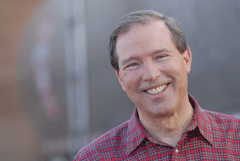 Congressman Tom Udall. (Courtesy of Udall for US All) YOUNG: Has concern about energy prices, particularly gasoline prices, made it more difficult to maintain a conservation-focused agenda when it comes to energy and the environment? TOM UDALL: There’s no doubt that we need to have a strong domestic industry. I believe in that and I support responsible drilling. New Mexico, in fact, is a producer state—we’re one of ten states in the United States that produce energy and export it to other places in America. And that’s something that I’m proud of that I’m going to continue to support. But the future is about alternatives. This isn’t a big quest to do something very ethereal this is about the jobs of the future. YOUNG: Most polls show Tom Udall with a comfortable lead over his republican opponent, congressman Steve Pearce. But recently Pearce has gained some ground on the energy issue. Pearce took to the House floor last month to pin the blame for pricey gas on Democrats. PEARCE: I believe in my heart that the majority does not want to drill today. I believe that they are understanding that it is not the oil companies who lack the diligence, but it is instead that roadblocks by people who have hijacked the energy policy of this country. YOUNG: A similar dynamic is emerging in the Colorado race, where republican candidate Bob Schaffer, a former congressman, worked for an energy company that mostly drills natural gas. Schaffer and some pro-drilling groups have hit Mark Udall hard for his opposition to offshore drilling and western oil shale development. [AD SOUND: Udall stood with extremist groups and voted to block bipartisan energy reform that could lower gas prices.] YOUNG: Some polling shows Schaffer's message getting traction and the race has tightened. Like his cousin, Mark Udall has adjusted his message. He now emphasizes support for domestic drilling as well as alternative energy. At a campaign rally in Fort Collins he said he'll throw the kitchen sink at the country's energy problems. MARK UDALL: We need everything. We need oil and gas executives, we just don't need them in the White House or the United States Senate writing our energy policy. YOUNG: Udall toured a Colorado State University facility that's working on diverse energy solutions, including these bubbling vats of algae that could become an economical source of biodiesel. MARK UDALL: So, there are just so many wonderful stories here in this building and across the parking lot and this is the future right here in front of us. 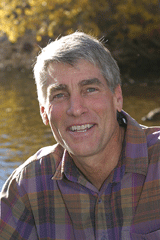 Congressman Mark Udall. (Courtesy of Udall for Colorado) MARK UDALL: No I’ve been working on this 12 years, by that I mean a new energy policy for the country and I always held that we have to do everything. What's exciting now is people are focused. Four dollar a gallon gas, people want to do something now. It’s been my motivation for running for the senate is to continue to lead the country in this direction. I've had to rethink some of my outlook YOUNG: Like what? MARK UDALL: Like nuclear power, for example. I grew up watching what happened at Three Mile Island and Chernobyl, and I thought the technology was dangerous and could cause great human harm and was probably one we shouldn’t invest in. but given the options that we have and if we’re serious about becoming energy self sufficient in our country and need to reduce carbon emissions, I think nuclear has to be part of the mix. in the long run though people know that renewable energy and all the new efficiency technologies are the way to go. And what we mean by that is 100 mile-per-gallon cars, plug in hybrids, providing incentives for people to trade in their old gas-guzzlers for new kinds of vehicle technology. Let's do it. Let's go. YOUNG: Mark Udall and Bob Schaffer are vying for a seat left open by the retirement of Republican Wayne Allard. Allard says Udall, who represents the state's liberal Boulder area, is out of the mainstream for most Coloradoans. But the state recently elected a Democratic governor and legislature. Former Colorado Democratic Senator and environmental policy expert Tim Wirth says that's largely due to changing attitudes in the region about how people will make their living on the land.  Jeff Young interviews Mark Udall on a tour of Colorado State University’s Engines and Energy Conversion Laboratory. (Photo: Lana Hoff) YOUNG: Both Mark and Tom Udall appear to be hedging their bets a bit, talking up domestic oil production while still pushing the clean energy agenda that seems to be closer to their core values. And if that doesn't work, Tom Udall says there's always the old family slogan. TOM UDALL: You have these Udalls in Colorado and New Mexico and Arizona and I just said, “Vote for the Udall nearest you.” (laughs) YOUNG: There's a lot of change afoot in the Rocky Mountain West, especially on energy issues. Election day will tell if the Udall family fits the kind of change voters’ want. For Living on Earth, I’m Jeff Young in Denver. Related links:
Antarctic Mash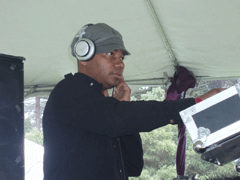
Paul D. Miller aka DJ Spooky in 2007. CURWOOD: OK, so with the Democratic Convention going so green, it only makes sense that the hip-hop culture wouldn’t be too far behind. And in fact, hip-hop artist DJ Spooky brought his new multimedia performance project from D.C. to the Mile-High city stage. Some would say this dude is more of a trip hop artist, and you can hear why in his work called “Terra Nova – An Antarctic Suite.” It’s made up of field recordings DJ Spooky made in Antarctica. Back home he manipulated samples and beats, to capture what he calls a “rapidly changing” and “vanishing environment under duress.” [DJ Spooky – Music from DJ Spooky’’s Multimedia installation : Terra Nova – An Antarctic Suite] SPOOKY: Antarctica to me is a place that’s at the edge of the map. It’s something that’s kind of almost like an invisible point that very few people, you know, literally, living will ever go to. [DJ Spooky – Music from DJ Spooky’’s Multimedia installation : Terra Nova – An Antarctic Suite] SPOOKY: When I was thinking about the project I wanted to think about DJ culture, contemporary art and sampling. How do you look at the environment itself as a kind of an archive. And what happens when the archive becomes part of collective consciousness, which is to me the world we live in. So, um, you know it’s an art project and its something that is hopefully going to get people to think about different ways of approaching environmental change and managing the human relationship to nature. [DJ Spooky – Music from DJ Spooky’’s Multimedia installation : Terra Nova – An Antarctic Suite] Throughout the last couple centuries artists have gone to Antarctica but the funny thing is film didn’t work up until recently because the temperatures were so extreme. Then, cameras also didn’t work until basically earlier this century when they were able to figure out some chemical solutions that would work in the extreme temperature. So most of the testimony was either in story, written form or drawn by hand. So were looking at a couple decades now of documentation of Antarctica with film, with photography and I wanted to think about that as the stepping point for digital media. [DJ Spooky – Music from DJ Spooky’’s Multimedia installation : Terra Nova – An Antarctic Suite] SPOOKY: In the U.S. the idea of the Urban is really defined by concrete. You know like you walk, you put one foot in front of the other, you’re not expecting the concrete to collapse. So there’s a kind of very centered, very you know kind of, standardized experience of being in the city. There’s concrete. There is heat. There is traffic. In this kind of place, all those variables are removed and you are the movement. Everything else, there’s no mammals, almost, the only eight, nine creatures are stuff like seals and penguins [DJ Spooky – Music from DJ Spooky’’s Multimedia installation : Terra Nova – An Antarctic Suite] And the sound is basically like you’re an intrusion. Your feet, you put one foot in front of the other, you hear the crunch of the ice against your boots, you hear the wind pushing against your clothes and the way that your clothes will ripple in the wind makes its own sound. The intense cold for me at least wasn’t as bad as the water. Like the water temperature is really really starkly different than anything I am used to. So if you fall in the water you die of hypothermic shock within in two to three minutes. So there’s a lot of ice and if you walk on the wrong patch of ice, you could fall, [laughter] fall right through.  Paul D. Miller aka DJ Spooky in 2007 SPOOKY: The whole notion of music for you know social fun, party stuff. I’ve tried, but it just didn’t feel right, I made a couple tracks for like Antarctica Party. [Laughter] SPOOKY: The penguins were looking at me like, what are you doing. Don’t forget I had an outdoor studio I would set up. And just kind of look at the landscape come up with certain sketches and compositions and you know see what would come out of the process. [DJ Spooky – Music from DJ Spooky’’s Multimedia installation : Terra Nova – An Antarctic Suite] SPOOKY: I guess its propaganda for change or propaganda for thinking about the world in a different way and seeing that there is just not one way. I know that sounds really simple, but you’d be surprised, a lot of my peers in the DJ scene or youth culture, hip-hop consumerism, bling-bling, people always tend just to look to the media just the next day or the next week. They don’t really look to the next 10, 20, 50, 100 years. [DJ Spooky – Music from DJ Spooky’’s Multimedia installation : Terra Nova – An Antarctic Suite] SPOOKY: Right now I think the biggest question facing everybody is that the planet is really going through a massive change. The film project is to kind of balance and think about art, music and creative processes and how they can, I think, at least be tools to change peoples perception of the environment. [DJ Spooky – Music from DJ Spooky’’s Multimedia installation : Terra Nova – An Antarctic Suite] CURWOOD: That’s hip-hop artist DJ Spooky, and an earful of his spooky “Terra Nova – an Antarctic Suite.” Related link:
Convention Wrap UpLet’s go now to Jeff Young in Denver for a wrap up on the Democratic National Convention. Jeff, at the end of all of this, what’s the take-away? YOUNG: Steve, I think there were two green headlines, if you will. One is these interwoven issues we’ve been talking about of climate change, energy, security, and the economy, all together that’s come fully ripe as an electoral issue. it is no longer on the backburner in American politics, that’s for sure. And headline number two has got to be Senator Obama’s embrace of nuclear power in his acceptance speech. That’s a pretty big deal. CURWOOD: Now, he said, what, we should safely harness nuclear power? YOUNG: That was the line, and I think that will be a challenge to a lot of folks in the environmental community who have opposed nuclear power for a long time and think the very notion of it being safe is impossible. It shouldn’t be that big of a surprise, Senator Obama has several times in the course of this campaign indicated that he thought nuclear power might be feasible. And if you look at his home state of Illinois, they get a lot of their electricity from nuclear power and the major provider of that nuclear-generated electricity, the Exelon Corporation, a lot of the executives from that company are major Obama supporters. CURWOOD: So now it’s on to Minnesota and the Republican convention, what can we expect there, Jeff? YOUNG: Well, I think we'll hear a lot of attacks on Democrats by Republicans, pinning the blame for high gas prices on the donkey, if you will. They want to say, “Hey this is Democrats fault because they had obstructed more offshore drilling.” However, Senator McCain has long championed action on climate change and capping carbon emissions. So I’m very curious to see how they’re going to try to balance those two things. CURWOOD: Now, what does the Republican platform say this year about climate change? Last time around they didn’t think that it was necessarily scientifically proven. YOUNG: Well, its different this time around and it’s um, much more of a mixed bag. They do acknowledge the reality of climate change and that humans are contributing to it, however the platform stops short of recommending a cap on carbon emissions. They propose more oil drilling, but they do not propose, in the platform, drilling for oil in the Arctic National Wildlife Refuge in Alaska. So, it’s a real mix and I thinkit’s the Republicans trying to find the right balance that they think will appeal to people—much the same way that the Democrats have been. CURWOOD: Sound like both are moving closer to the middle? YOUNG: Well, that’s certainly the stage of the electoral dance that we are in right now. Uh, they are trying to move to the center to appeal to those very important moderate and independent voters who may very well determine the outcome of this election. CURWOOD: Living on Earth’s Jeff Young in Denver. Thanks so much. Related link:
[UNEXPECTED SOUNDS] CURWOOD: We leave you this week with yet more sounds from Denver. As people walk down the street, the work of audio artist Jim Green greets them, drifting up from large grates. [GRATE SOUNDS] Living on Earth’s Bobby Bascomb sampled this unlikely soundscape for us. [GRATE SOUNDS] CURWOOD: Living on Earth is produced by the World Media Foundation. Our crew includes Ashley Ahearn, Bobby Bascomb, Eileen Bolinsky, Bruce Gellerman, Ingrid Lobet, Helen Palmer, Mitra Taj and Jeff Young, with help from Sarah Calkins and Marilyn Govoni. Thanks for listening. ANNOUNCER: Funding for Living on Earth comes from the National Science Foundation, supporting coverage of emerging science, and Stonyfield Farm: organic yogurt and smoothies. Stonyfield pays its farmers not to use artificial growth hormones on their cows. Details at stonyfield.com. Support also comes from you our listeners, the Ford Foundation, the Town Creek Foundation, the Oak Foundation supporting coverage of climate change and marine issues; the Bill and Melinda gates Foundation, dedicated to the idea that all people deserve the chance to live a productive and healthy life. Information at Gates Foundation dot org. And Pax World Mutual Funds: socially and environmentally sustainable investing. Pax World: for tomorrow. On the web at paxworld.com. ANNOUNCER2: PRI, Public Radio International. Living on Earth wants to hear from you!Living on Earth Newsletter [Click here]
Donate to Living on Earth! NewsletterLiving on Earth offers a weekly delivery of the show's rundown to your mailbox. Sign up for our newsletter today!
|





